Galamsey: The menace destroying Ghana
)
Galamsey involves the extraction of minerals, particularly gold, without proper authorization from the government.
Though, the government has been working to address this issue through various measures, including increased law enforcement, stricter regulations, and educational campaigns.
However, the effectiveness of these measures has been a subject of debate, and the challenge persists. In a recent address at the 2023 Africa Climate Summit in Nairobi, Kenya; President Nana Addo Dankwa Akufo-Addo said Ghana’s ban on galamsey is yielding good results.
President Akufo-Addo added that several flagship policy initiatives such as planting for food and jobs, one village, one dam, and the ban on illegal mining have all contributed to reducing carbon emissions and building the country’s resilience to the impact of climate change.
“We placed a ban on illegal mining the phenomenon we call galamsey which was destroying our water bodies, vegetation, and our forest. Some 20, 000 young people have been engaged to plant more than 30 million trees in two years to create jobs and restore degraded lands.

“These policy initiatives are already yielding positive results in the attainment of SDG Goals, particularly the goal of reducing our carbon emissions,” President Akufo-Addo said.
Despite the assurances the government has made to the people of Ghana in curbing this menace, galamsey severely persists in some parts of the country.
In his paper, “The Galamsey Menace in Ghana: A Political Problem Requiring Political Solution?”, Dr. Abdul-Gafaru Abdulai posits that “Galamsey operators are aware of the importance of their votes for incumbent political parties, and have often exploited the political vulnerability of those in power (due to intense electoral competition) during election years. Around the 2016 elections, galamsey miners set off to vandalize the offices of various political parties amidst chants of “no galamsey, no votes”.
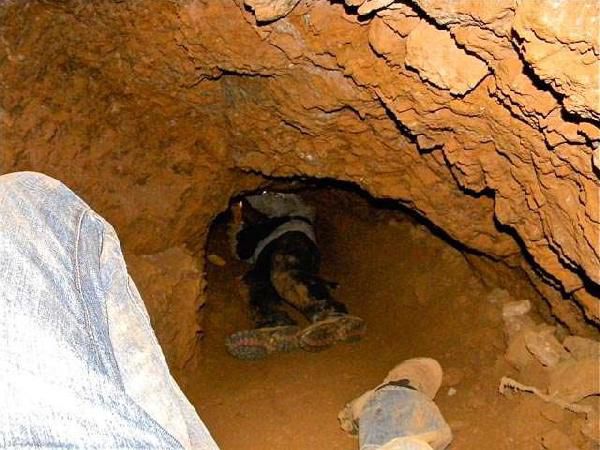
He argued that “Illegal mining has also persisted in Ghana not because of weak state capacity, as some have claimed, but primarily because of political leniency and law enforcement corruption.”
“Illegal mining has continued to flourish because it serves the interests of a wide range of actors, including some chiefs who gain through the royalties they receive in exchange for land; and the political, business, and local elite who own the concessions that operate outside the legal mining framework,” the research found.
In “Galamsey Fight in Ghana: An Analysis of Failure of Government Interventions Since 1989” Richmond Yeboah also highlighted the difficulty of the state in curbing this menace.
“The involvement of the Chinese and the weak legal/institutional framework contribute significantly to the failure.”
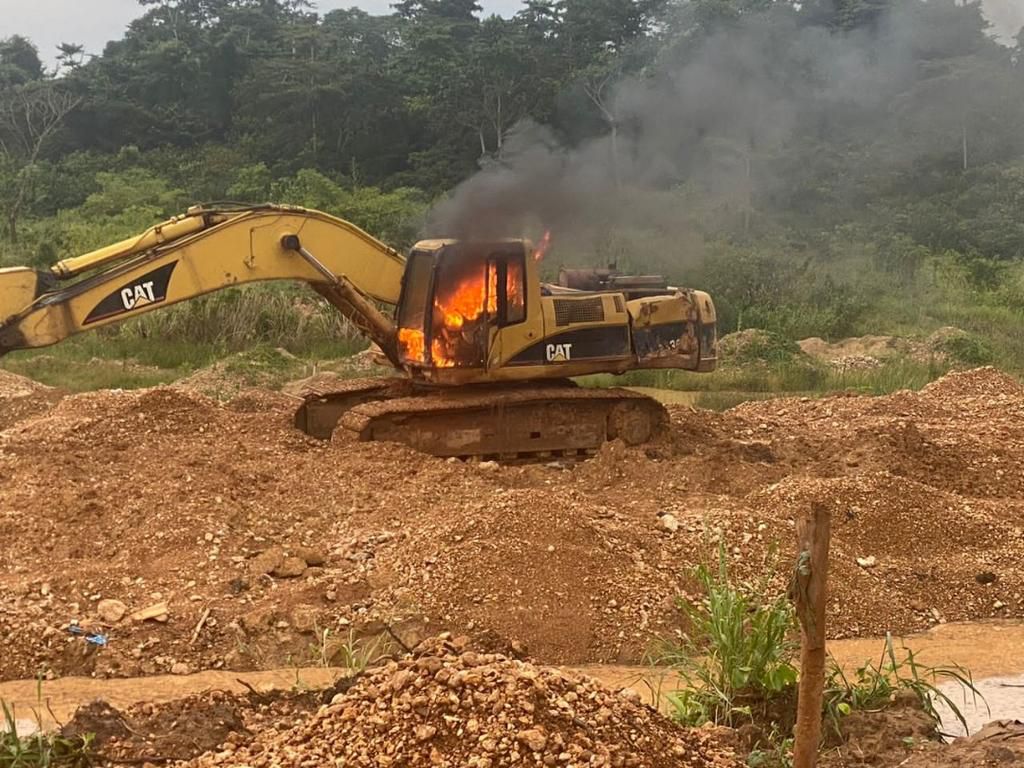
The study also found that the incidence of bribery and corruption impeded the fight against IGM in Ghana. Respondents alleged that local miners and their collaborators paid huge sums of money to members of the illegal mining task force to compromise their activities. Interviews with respondents revealed that members of the anti-illegal mining task force had been extorting monies from illegal miners and had left them to operate when they were supposed to arrest them and seize their equipment. Given this, illegal miners continued to operate with impunity.
The devastation to the country from these impunities varies in different forms that threaten the existence of the Ghanaian in the immediate future. They come in the form of:
Environmental Degradation:
Deforestation: Galamsey often involves clearing large areas of forests to access mineral deposits. This leads to loss of biodiversity, and disruption of ecosystems, and contributes to climate change.
For example, the Atewa Forest Reserve in Ghana is one of the critical forest reserves affected by illegal mining activities. The forest reserve is known for its high biodiversity, and it provides water for several communities in Ghana. The forest is also home to some rare and endangered species of plants and animals. However, illegal mining activities in the forest have led to the destruction of large tracts of forest cover, causing significant damage to the ecosystem.
Water Pollution: The use of toxic chemicals like mercury and cyanide in the extraction process contaminates water sources, affecting both aquatic life and communities downstream who rely on these water bodies.
In his study “The Dangerous Couple: Illegal Mining and Water Pollution—A Case Study in Fena River in the Ashanti Region of Ghana,” Albert Ebo Duncan found out that the poor and marginal quality of the Fena River poses a threat to the health of the riparian communities which still depend on water for domestic activities such as cooking and feeding on fishes harvested from the river.
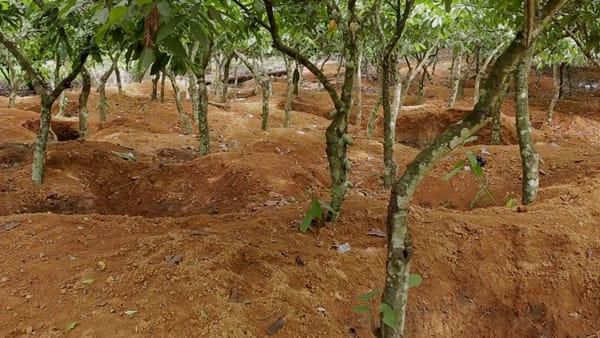
The study also found out that “concentrations of the polluting metals were far higher than the permissible limit which is an indication that Fena River is polluted by three of the studied metals.”
“Metal pollution concentrations at the sites have been influenced by the intensity of illegal mining going on or that went on earlier before or during the sampling period.”
Health Risks:
Exposure to Toxic Substances: People, including miners and nearby communities, face health risks due to exposure to hazardous substances used in illegal mining. Mercury, in particular, is a neurotoxin that can have severe health implications.
Respiratory Issues: Dust and fumes generated during mining operations can lead to respiratory problems for those in proximity.
Social Impacts:
Displacement: Communities living in areas rich in minerals may be displaced due to the expansion of illegal mining operations. This displacement can lead to social unrest and loss of livelihoods.
Mining operations are known to have adverse effects on the living conditions of the natives of those communities who depend solely on the land for livelihood. Most of the indigenes depend on farming and the sale of farm produce as their main source of income. However, mining operations tend to dispossess and displace the holders of the land thereby depriving them of their only source of livelihood. For instance, mining operations in Tarkwa have caused farmers to lose their farmlands to mining activities.
Child Labor: Galamsey operations often involve the exploitation of children who work in hazardous conditions, affecting their health and denying them educational opportunities.
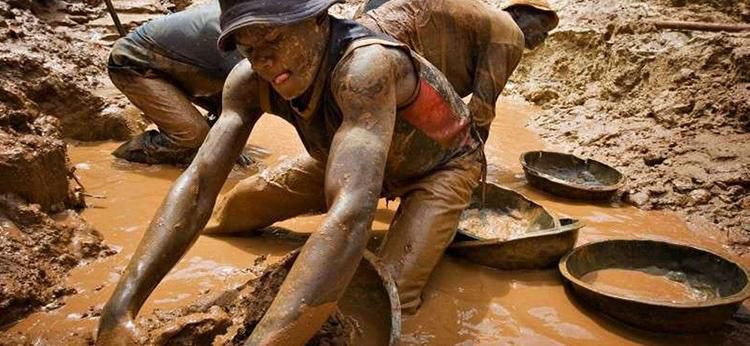
Peter Ayamga, the District Chief Executive of Bongo in the Upper East Region of Ghana bemoaned the connection of galamsey and child labor in his district.
He said the fight against ‘galamsey’ or illegal mining activities in the country, if successful, would impact positively on curbing child labor in mining communities.
Mr Ayamga stated this in 2017 during a debate to commemorate this year's World Day Against Child Labour. Two schools, Soe Senior High School (SHS) and Azeem-Namoa Senior High Technical participated in a debate on the topic: "Children should not be involved in any form of child labour." The debate was organized by the Bongo District Assembly.
According to Mr Ayamga, it was important for all stakeholders to support efforts to halt galamsey, since it hurt the development of children.
He further explained that parents and teachers, particularly in mining communities, should ensure that children under 18 years who were also supposed to be in school were not found doing menial and hazardous jobs.
Economic Consequences:
Revenue Loss: While illegal miners may benefit in the short term, the overall economy suffers due to the loss of revenue that would have been generated through legal and regulated mining activities.
Impact on Agriculture: Contamination of water sources and destruction of arable land can harm agriculture, affecting food security.
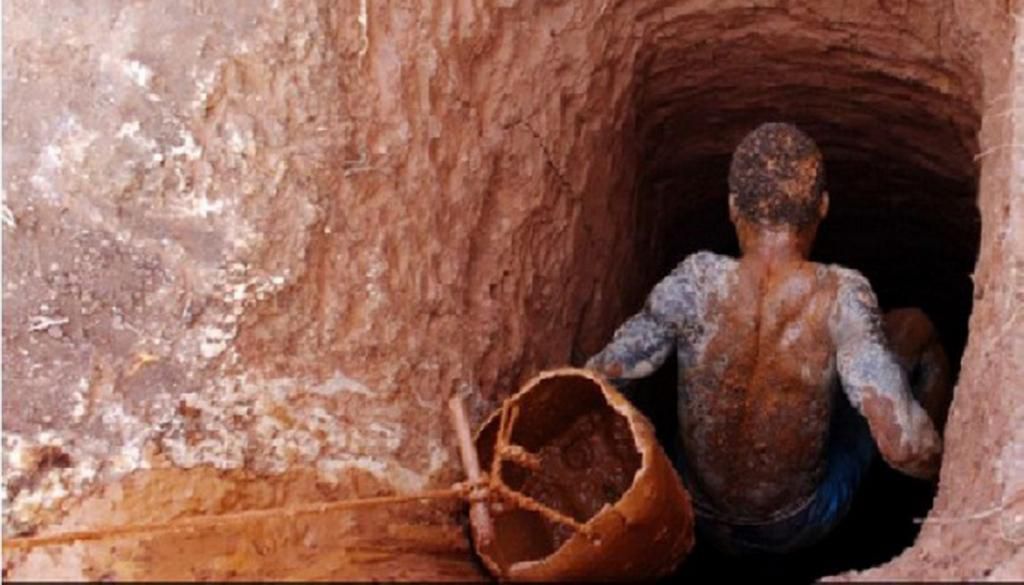
Nathaniel Gyimah in his study “Impact Of Galamsey Operations On Agricultural Land And Livelihood Of Farmers: A Case Study Of Affiena Community In Wassa Amenfi West District Of Western Region, Ghana” found out that “Galamsey operations are increasingly threatening agriculture production through the destruction of lands in the area. Different kinds of crops such as cocoa, plantain, cassava, maize, cocoyam, and rice on the land are destroyed carelessly by galamsey operations which have brought up prices of foods since farm labours are hard to be hired because they have shifted their work abilities to galamsey operations.
The uncovered pits of the operations are now trapped for the death of unknown people and also breeding places for mosquitoes in the area. Moreover, the water bodies that serve as drinking water have been polluted by the galamsey operations; therefore, this has resulted in a high rate of cholera in the area.
However, part of the money negotiated was not paid to farmers, and they regretted giving out their lands for galamsey operations but the few farmers who received full monies used to build and cater for their wards in school.”
Government and Regulatory Challenges:
Corruption: Illegal mining often involves corruption at various levels, making it difficult for regulatory bodies to enforce laws and regulations.
The former Minister for Environment, Science, Technology and Innovation and a former chairman of the Inter-Ministerial Committee on Illegal Mining (IMCIM), Professor Kwabena Frimpong-Boateng accused the New Patriotic Party (NPP) government of paying lip service to the galamsey menace.
Professor Frimpong-Boateng in a statement pointed out that the destruction of the water bodies by alleged criminals will be evident in the future.
“I am not at all surprised with that characterization by the Attorney General. We can all close our eyes and bagatellize the destruction of the environment and its biodiversity, but the reality of these criminal actions by people who have no conscience and love for the country will be evident in the near future if not soon,” he stated.
Prof. Frimpong-Boateng in the galamsey report accused some stalwarts of the New Patriotic Party of engaging in galamsey and interfering in the work of the Inter-Ministerial Committee on Illegal Mining (IMCIM) which he (Prof. Frimpong-Boateng) chaired.
The Attorney-General in an advice dated September 12, 2023, to the Criminal Investigations Department of the Ghana Police Service on September 14, 2023, said the former chairman failed to provide the necessary evidence to back his report for the prosecution of persons indicted.
Resource Management Issues: It becomes challenging for the government to manage and sustainably exploit mineral resources for the benefit of the nation.
)
)
)
)
)
)
)
)
)
)
)
)
![Messi visit turns ugly in Kolkata as frustrated fans revolt at stadium [Video]](https://sportal365images.com/process/smp-images-production/pulse.com.gh/13122025/063490d8-7f44-4fee-ae15-4e386efec018.jpg?operations=autocrop(112:112))
)
)
)